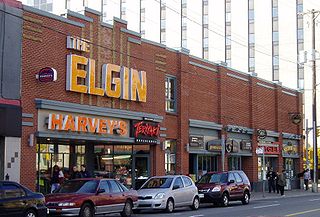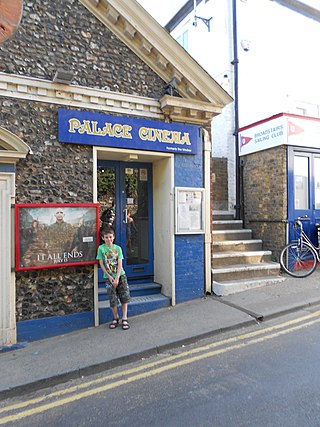
The Empire, Leicester Square is a cinema currently operated by Cineworld on the north side of Leicester Square, London, United Kingdom.

The Odeon Luxe Leicester Square is a prominent cinema building in the West End of London. Built in the Art Deco style and completed in 1937, the building has been continually altered in response to developments in cinema technology, and was the first Dolby Cinema in the United Kingdom.

The Odeon Luxe West End is a two-screen cinema on the south side of Leicester Square, London. It has historically been used for smaller film premieres and hosting the annual BFI London Film Festival. The site is on an adjacent side of the square to the much larger flagship Odeon Luxe Leicester Square.
Odeon Cinemas Limited, trading as Odeon, is a cinema brand name operating in the United Kingdom, Ireland, Norway and Greece, which along with UCI Cinemas and Nordic Cinema Group is part of the Odeon Cinemas Group subsidiary of AMC Theatres. It uses the famous name of the Odeon cinema circuit first introduced in Great Britain in 1930. As of 2016, Odeon is the largest cinema chain in the United Kingdom by market share.
Swansea city centre in Swansea, Wales, contains the main shopping, leisure and nightlife district in Swansea. The city centre covers much of the Castle ward including the area around Oxford Street, Castle Square, and the Quadrant Shopping Centre; Alexandra Road, High Street, Wind Street and the Castle; Parc Tawe; and the Maritime Quarter extending down to the seafront.

The Elgin Theatre was a historic movie theatre located at the corner of Lisgar and Elgin Street in Ottawa, Ontario, Canada. The 750 seat cinema opened in 1937, with the first film shown being Stand-In. For several decades it was one of Ottawa's premier theatres, and in 1947 it was the location of the world premiere of Mary Pickford's Sleep, My Love.

A multiplex is a movie theater complex with multiple screens or auditoriums within a single complex. They are usually housed in a specially designed building. Sometimes, an existing venue undergoes a renovation where the existing auditoriums are split into smaller ones, or more auditoriums are added in an extension or expansion of the building. The largest of these complexes can sit thousands of people and are sometimes referred to as a megaplex.

The Regent Theatre is a theatre in Stoke-on-Trent, England. Constructed in 1929 as a cinema, it is one of several theatres in the city centre and one of two operated by the Ambassador Theatre Group on behalf of Stoke-on-Trent City Council. The building was converted for full-time use as a theatre in 1999, and since then has hosted a number of shows and musicals. The theatre is also the northern base for the Glyndebourne Touring Opera.

Athena is a Grade II-listed events venue in the cultural quarter of Leicester City Centre, England. Built originally as an Odeon Cinema in 1936, it closed for most of the 1990s and remained vacant up until 2005, where the building was restored as a multi-discipline events venue.
The ABC cinema, on Clarkston Road in the Muirend area of Glasgow, existed from 1933 to 2001. At the time of its closing, it was the second-oldest working cinema in Glasgow, Scotland.

The Dome Cinema, Worthing, West Sussex, England, is a grade II* listed building owned by PDJ Cinemas Ltd. The Dome Cinema, which has three screens and a Projectionist's Bar is run by PDJ Cinemas, while Alfresco Services run two function rooms and the cafe at the front of the building. It has closed for refurbishment several times, most recently between December 2005 and July 2007. The name derives from the distinctive dome on top of a three-storey tower over the entrance.

The Odeon Marble Arch was a cinema in London located opposite Marble Arch, at the top of Park Lane, with its main entrance on Edgware Road. It operated in various forms from 1928 to 2016, and is most famous for once housing a vast screen capable of screening films in 70mm. The machines were Cinemeccanica Victoria 8 models.
Two Odeon cinemas were formerly located in Leeds, West Yorkshire, England:
The Odeon Haymarket was a cinema on Haymarket, London. Three cinemas occupied the site between 1925 and 1996, predecessors being Capitol Cinema (1925–1936) and Gaumont Haymarket (1937–1959). It became the Odeon Haymarket in 1962, before closing in 1996.
Bradford Odeon is the name applied to two different cinemas in central Bradford, West Yorkshire, England. One, in Godwin Street, was built in 1930 and survives; the other, in Manchester Road, was built in 1938 and demolished in 1969.

The Deco is a restored 1930s cinema and theatre located in the heart of Northampton, England. It is now operated as a venue for corporate, social and theatrical events.

The Everyman Gerrards Cross is a cinema located in Gerrards Cross, Buckinghamshire, England. Originally known as The Playhouse, it has continually served Gerrards Cross as a cinema since it first opened in 1925 and is the oldest cinema in Buckinghamshire. It has been owned by several cinema chains and is currently operated by Everyman Cinemas.

The Ritz is a former cinema and theatre in Lincoln, England, currently in use as a pub.

The Palace Cinema is an independent single-screen cinema in Broadstairs, Kent, England. Housed in a converted commercial building, it opened in 1965 as the Windsor Cinema, and was renamed the Palace in 2006. It now shows mainly independent films. The Grade II listed building is in Harbour Street, close to the beach at Viking Bay.

The Odeon Cinema is a cinema in Harrogate, in North Yorkshire, England. Built in 1936, it is notable for its Art Deco style. It is a Grade II listed building.















